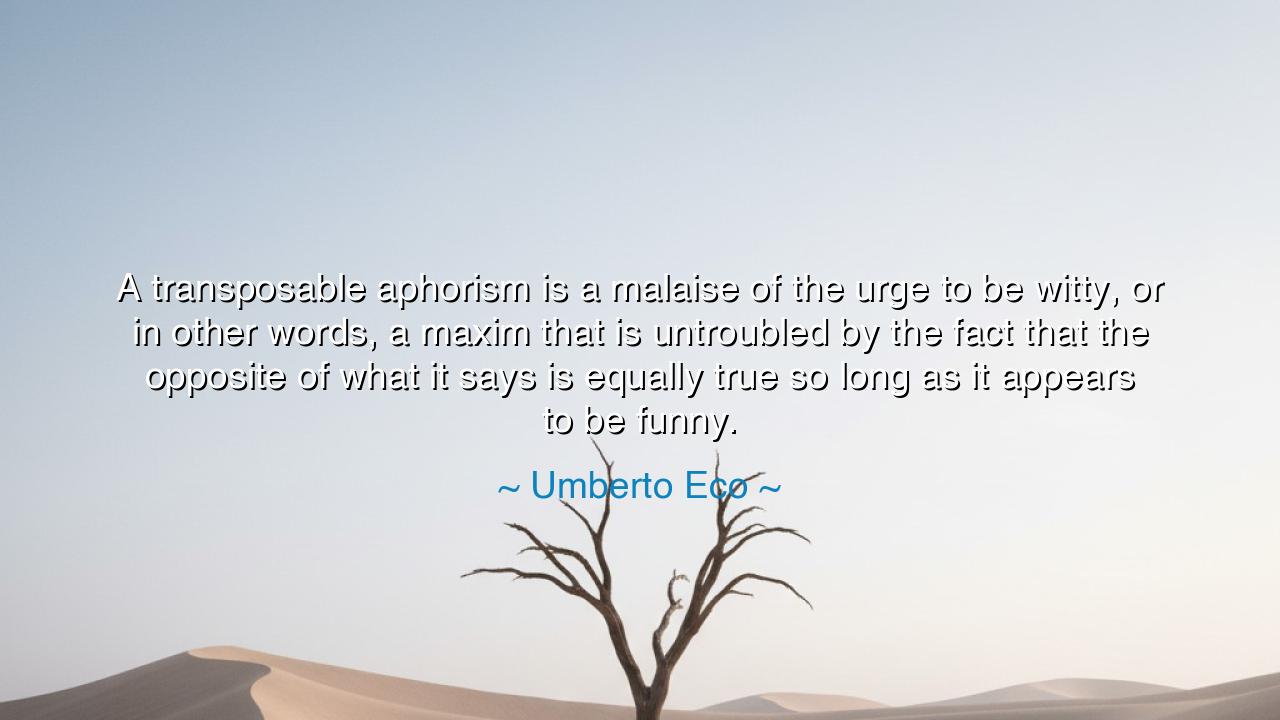
A transposable aphorism is a malaise of the urge to be witty, or
A transposable aphorism is a malaise of the urge to be witty, or in other words, a maxim that is untroubled by the fact that the opposite of what it says is equally true so long as it appears to be funny.






“A transposable aphorism is a malaise of the urge to be witty, or in other words, a maxim that is untroubled by the fact that the opposite of what it says is equally true so long as it appears to be funny.” Thus spoke Umberto Eco, the philosopher and storyteller whose mind bridged logic and myth, laughter and wisdom. His words are sharp and intricate, yet they pierce the heart of a modern ailment: the tendency to value cleverness over truth. In this reflection, Eco warns that wit without wisdom becomes sickness of the intellect—a brilliance that blinds rather than illuminates. He reminds us that the tongue that shines too quickly may speak nothing at all.
To understand this, we must first look upon the transposable aphorism, that seductive turn of phrase which dazzles the ear but deceives the mind. It is a statement that sounds profound in any direction, a truth so flexible it ceases to have meaning. It delights in its symmetry, yet empties itself of substance. Eco calls it a malaise—a sickness of the spirit that mistakes the glitter of language for the gold of understanding. For in the age of quick words and shorter thought, many seek not to reveal truth, but to appear wise, to trade in cleverness as if it were insight. Such words, though adorned with laughter or irony, carry no weight; they are the feathers of speech without the bones of conviction.
The origin of this idea lies in Eco’s lifelong study of language, symbol, and the labyrinth of human thought. As a scholar of semiotics, he understood that words are vessels—they can carry truth or emptiness depending on the heart that wields them. He saw in modern discourse the rise of the performative mind, one that desires not knowledge, but applause. In such a world, even wisdom becomes entertainment. A phrase that can sound profound no matter its direction—a transposable aphorism—is like a mirror reflecting nothing but its own reflection. It glitters, but it does not guide.
The ancients, too, wrestled with this temptation. The Sophists of Greece were masters of language, able to argue any side of a question with eloquence and charm. They spoke beautifully but cared little for truth, and for this, Socrates condemned them. He called their art “the shadow of virtue,” for it imitated wisdom without possessing it. Eco’s critique mirrors that ancient struggle: the war between the wise and the clever, between the one who seeks truth and the one who seeks laughter. To be witty, he warns, is not evil—but to be witty without conscience is to speak in hollow echoes.
There is a story of the Roman orator Cicero, who, upon hearing a man deliver a speech full of polished wordplay, asked him afterward, “You have moved us, but to what end?” The man could not answer. For beauty of speech is empty when it leads nowhere. So too does Eco’s aphorism ask of us: what is the purpose of our words? Are they crafted to enlighten or merely to amuse? In the desire to appear clever, we may lose the humility that gives words their power. A truth that is transposable—equally valid in its opposite—is no truth at all, only a trick of rhetoric.
Eco’s tone, though critical, is not cruel. Beneath his irony lies compassion—for he sees that this malaise comes not from malice, but from the human desire to belong, to impress, to matter. The one who crafts such empty wit does so out of fear: fear of silence, fear of being unseen. And yet, Eco urges us toward something nobler—to speak less and mean more, to resist the urge to adorn our thoughts with false symmetry. He reminds us that truth is not symmetrical, that it resists easy balance, that it demands effort, depth, and sometimes discomfort.
So, dear listener, take this wisdom as both mirror and challenge. Do not chase cleverness at the cost of clarity. Let your words serve purpose, not vanity. When you speak, ask yourself: does what I say reveal, or merely entertain? Do my words build understanding, or do they dazzle and disappear like sparks in the dark? For wit that forgets wisdom is like lightning without thunder—it flashes bright, but leaves no echo in the soul.
As Umberto Eco teaches, true intelligence is not in saying what sounds good, but in saying what is good and true. Resist the fever of false brilliance. Be wary of the transposable, the too-neat, the too-clever. Speak with thought, and let your silence carry weight when words cannot. For the wise have always known: the highest form of wit is not to make others laugh, but to make them see.






AAdministratorAdministrator
Welcome, honored guests. Please leave a comment, we will respond soon